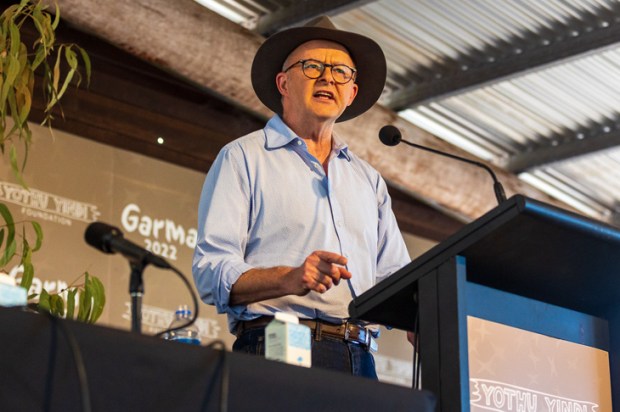As another bleak winter NAIDOC Week draws to a close, let us reflect on the strange ritual that is the Acknowledgement of Country. That is, the obligatory mumble about paying respects to the traditional owners of the land upon which a drab office block or dingy school hall is situated, and within which a dreary meeting or joyless assembly is about to be held. ‘Elders past and present’ are then acknowledged, even though the ‘present’ Elders are rarely actually present, and the past Elders most certainly aren’t – unless you believe they have nothing better to do with their afterlife than hang about like ghostly auditors, making sure they get acknowledged.
A while back I had a gig as a corporate trainer in communication and interpersonal skills, which was essentially a course in pretending to listen respectfully to annoying people. One day an Aboriginal participant, a public servant with whom I had chatted briefly before the class, interrupted me mid-introduction to protest that I had failed to Acknowledge Country. He felt very uncomfortable about it, he said. As an Aboriginal man, he said, he wasn’t sure he could continue being present in the room without a proper acknowledgement of the traditional owners. And furthermore, he went on to say, he was particularly disappointed that an Aboriginal woman such as myself could be so disrespectful. The life of such a culturally observant Aboriginal man can’t be easy. The poor bugger could never even do something as ordinary as sit down to eat a meal in a restaurant, for instance. Until there is suitable upgrade to standard McDonald’s customer service, he would be obliged to take his presence, along with his burger and fries, away to an appropriately Acknowledged environment. It doesn’t seem right that a proud First Australian should have to endure lonely mealtimes in a fast-food joint carpark (though perhaps not that lonely, with a vehicle full of all those disembodied, omniscient and emotionally needy Elders and Traditional Owners) while all you ignorant, insensitive white folk get to sit comfortably inside your fancy restaurants, creating your own delicious burgers and enjoying convenient all-day breakfasts.
All this Acknowledgement business is easy to mock from a distance, but anyone who has felt the pressure to say the words knows it’s a serious business when it’s up close and professional. I got off relatively lightly that morning in the classroom: once I’d made it clear that I would not pretend to share his beliefs, my Aboriginal interrupter cheerfully announced that my disrespectful attitude would one day earn me a well-deserved bashing. Since the rest of the class was made up of sensitive, educated, social-justice-oriented ladies, they were quite satisfied that this was an appropriate resolution and their training in ‘Dealing with Difficult People’ could comfortably resume.
Of course, if it had been you in my position that day, it might have been a very different story. In today’s enlightened workplaces, it is understood that you should Acknowledge Country only if it is something you truly believe in. It is also understood that if you don’t do it, you’re toast. Simply forgetting to Acknowledge can be a mortifying but non-fatal professional faux pas, but an outright refusal to utter the words could have you clearing out your desk before you can say ‘Reconciliation Action Plan’. Sometimes all it takes is for somebody a bit like me to complain that your attitude makes me feel culturally unsafe. Didn’t you read the code of conduct? Racism will not be tolerated, so out you go.
Even though I am nobody’s idea of a successful professional-type person, I am now going to be a little presumptuous and hand out some career advice: If it is your company’s policy to Acknowledge Country on certain occasions, just do it. If it isn’t official policy but there is certainly plenty of pressure to do so, just do it. If you feel compromised and unhappy about saying words you don’t really mean, or if you dread situations where you might be obliged to perform a ritual that you don’t really believe in, my recommendation is that you stop worrying about things beyond your control and just do it. Unless your situation is extraordinary, any puny resistance you could muster against the orthodoxy is likely to achieve very little. You would gain no benefit, and you could very easily lose almost everything – your career, friends, reputation, and possibly your bank balance if someone like me deemed your behaviour legally offensive.
On the other hand, if everything within you rebels against parroting pious absurdities, and if enforced mysticism in the name of ‘cultural sensitivity’ causes you not just philosophical discomfort but visceral disgust, then my advice to keep your head down and play along is of no use to you. You have no choice but to get yourself in trouble, or trouble is going to come looking for you.
Fortunately, you can exercise plenty of choices in how you prepare for and conduct yourself in the aftermath. You can choose to be annoyingly upbeat and jolly when everyone expects to see fear. You can be frustratingly vague and tranquil when you are supposed to be frantically justifying yourself. You can be haughty when you are meant to be grovelling. You can choose when to stonewall your inquisitors with dignified silence, and when to out-righteous the righteous with the primmest of platitudes. Most importantly, you can choose to never, ever apologise if you believe you have done nothing wrong. You won’t win, of course, but there is a perverse pleasure to be found in being a troublesome, unsatisfying victim. Now that I think about it, the most effective tactics bear some resemblance to those ‘Dealing with Difficult People’ courses – but rest assured that the practical applications can be ever so much more fun.
The post Australian notes appeared first on The Spectator.
Got something to add? Join the discussion and comment below.
Get 10 issues for just $10
Subscribe to The Spectator Australia today for the next 10 magazine issues, plus full online access, for just $10.
You might disagree with half of it, but you’ll enjoy reading all of it. Try your first month for free, then just $2 a week for the remainder of your first year.













Comments
Don't miss out
Join the conversation with other Spectator Australia readers. Subscribe to leave a comment.
SUBSCRIBEAlready a subscriber? Log in